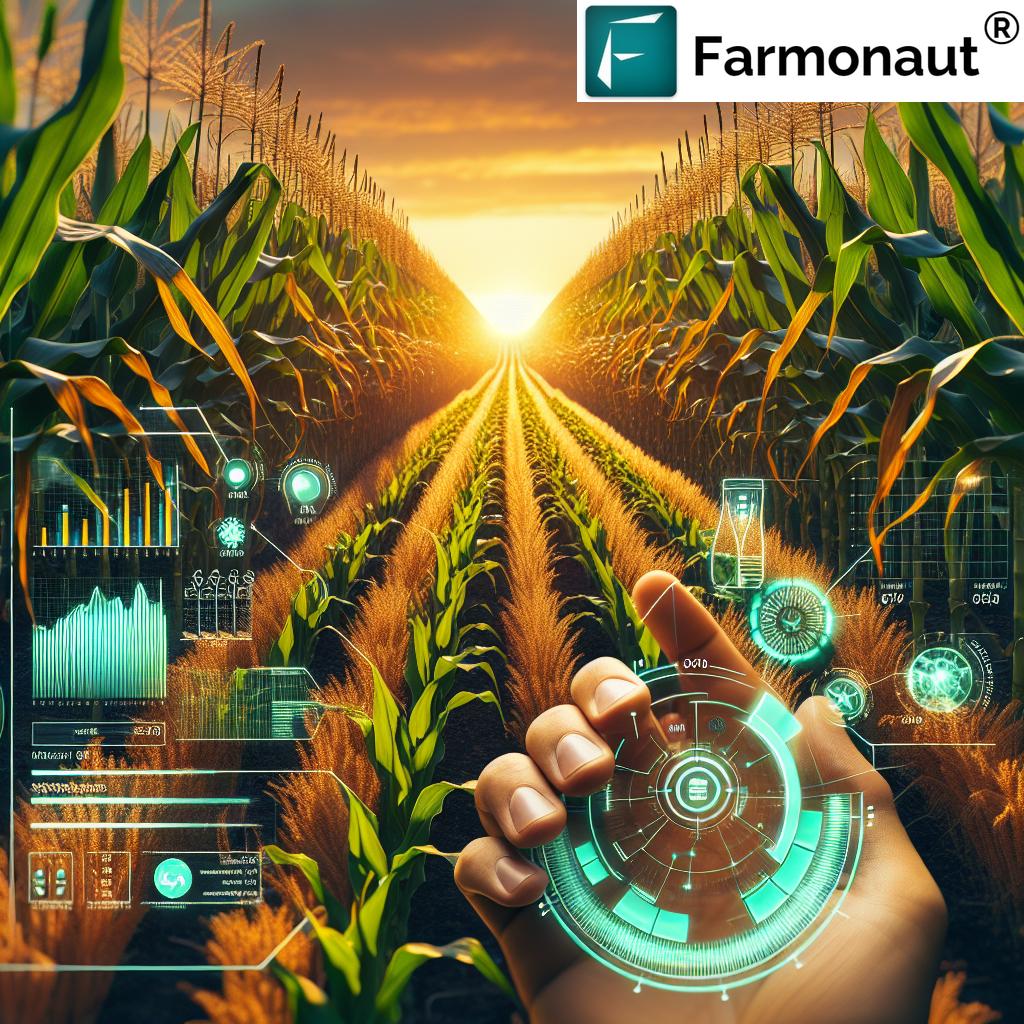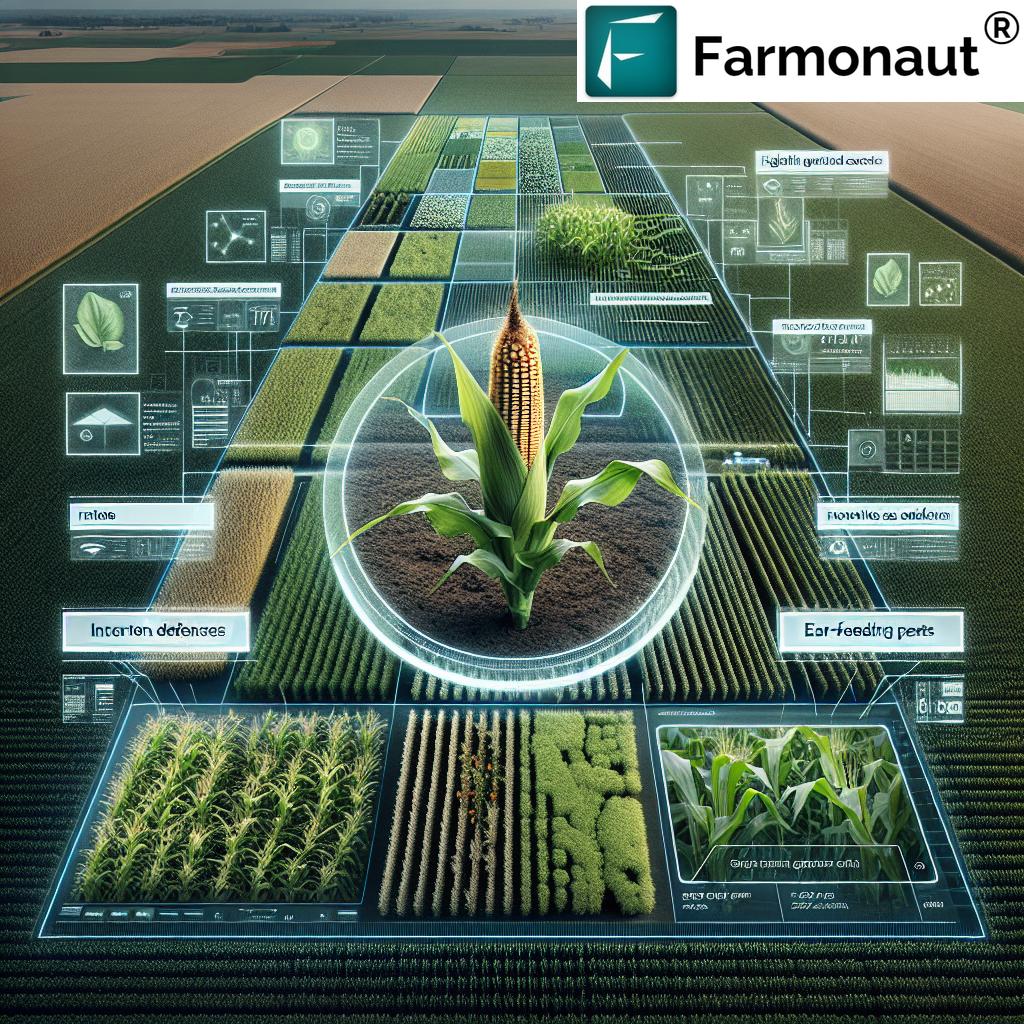Revolutionizing US Corn Farming: Advanced Pest Control and Yield Enhancement with Precision Agriculture Technology

“Advanced trait stacks in corn farming can effectively combat up to 16 different pests while preserving field health.”
In the ever-evolving landscape of US agriculture, corn farming stands at the forefront of innovation. As we navigate the challenges of feeding a growing global population while maintaining sustainable practices, the integration of advanced pest control and precision agriculture technology has become paramount. In this comprehensive exploration, we’ll delve into the cutting-edge solutions revolutionizing corn production, with a focus on advanced insect control for corn and crop yield enhancement techniques.
The Evolution of Corn Pest Management
Corn, a staple crop in US agriculture, has long been susceptible to a variety of pests that can significantly impact yield and quality. Traditional pest management methods, while effective to some degree, often fell short in providing comprehensive protection against the myriad of threats faced by corn crops. However, the landscape of corn pest management has undergone a dramatic transformation in recent years, thanks to the advent of advanced technologies and innovative approaches.
Multiple Modes of Action: A Game-Changer in Pest Control
One of the most significant advancements in corn pest management has been the development of multiple modes of action pest control. This approach combines different mechanisms to combat pests, significantly reducing the likelihood of resistance development and providing more robust protection for corn crops.
- Broad-spectrum protection: Multiple modes of action offer defense against a wide range of pests, including the notorious corn rootworm.
- Resistance management: By utilizing various pest control mechanisms, we can mitigate the risk of pests developing resistance to any single control method.
- Sustainable approach: This strategy aligns with sustainable farming practices by reducing the need for frequent pesticide applications.
Explore Farmonaut’s advanced pest monitoring tools: Web App
Integrated Pest Management in Agriculture: A Holistic Approach
Integrated pest management (IPM) in agriculture represents a holistic approach to pest control that combines biological, cultural, physical, and chemical tools to minimize economic, health, and environmental risks. This strategy is particularly effective in corn farming, where a diverse array of pests can threaten crop yields.
Key Components of IPM in Corn Farming
- Monitoring: Regular field scouting and use of precision agriculture technology for early pest detection.
- Prevention: Implementing cultural practices like crop rotation and planting resistant varieties.
- Intervention: Using a combination of biological controls, targeted pesticides, and advanced trait technologies when necessary.
- Evaluation: Continuous assessment of pest management strategies to refine and improve practices.
By adopting IPM strategies, corn farmers can significantly reduce their reliance on chemical pesticides, leading to more sustainable and environmentally friendly farming practices.
High-Yield Corn Hybrid Traits: Engineering Success
The development of high-yield corn hybrid traits has been a game-changer in the quest for increased productivity and resilience in corn farming. These genetically engineered varieties offer a range of benefits that address the complex challenges faced by modern farmers.
Advantages of Advanced Corn Hybrids
- Enhanced pest resistance: Built-in protection against common corn pests, reducing the need for chemical interventions.
- Improved drought tolerance: Ability to withstand water stress, crucial in the face of changing climate patterns.
- Optimized nutrient use: More efficient utilization of soil nutrients, leading to reduced fertilizer requirements.
- Increased yield potential: Genetic improvements that allow for higher yields under optimal conditions.
Enhance your corn yield with Farmonaut’s satellite-based monitoring: Android App

Precision Agriculture Technology: The Future of Corn Farming
Precision agriculture technology has emerged as a cornerstone of modern corn farming, offering unprecedented levels of insight and control over crop management. By leveraging data-driven approaches and advanced monitoring systems, farmers can optimize every aspect of their operations.
Key Technologies Transforming Corn Production
- Satellite imagery and remote sensing: Providing real-time data on crop health, pest infestations, and soil conditions.
- GPS-guided machinery: Enabling precise planting, fertilizer application, and harvesting.
- IoT sensors: Monitoring soil moisture, temperature, and other critical parameters for informed decision-making.
- AI and machine learning: Analyzing complex datasets to predict pest outbreaks and optimize resource allocation.
These technologies not only enhance productivity but also contribute to more sustainable farming practices by reducing waste and minimizing environmental impact.
Access precision agriculture tools with Farmonaut: iOS App
Refuge Seed Blends: A Strategic Approach to Pest Control
Refuge seed blends represent a innovative strategy in corn pest management, designed to combat the development of resistance in pest populations while maintaining high yields. This approach involves planting a mixture of Bt (Bacillus thuringiensis) corn and non-Bt corn within the same field.
Benefits of Refuge Seed Blends
- Resistance management: Slows the development of pest resistance to Bt traits.
- Simplified compliance: Eliminates the need for separate refuge areas, making implementation easier for farmers.
- Consistent protection: Provides uniform pest control across the entire field.
- Yield optimization: Maintains high yield potential while ensuring long-term sustainability of Bt technology.
By incorporating refuge seed blends into their corn farming practices, growers can effectively manage pests while preserving the efficacy of valuable pest control traits for future generations.
“Precision agriculture technology for corn pest management has demonstrated significant yield advantages in field trials, boosting profitability.”
Advanced Trait Stacks: Comprehensive Protection for Corn Crops
Advanced trait stacks represent the pinnacle of biotechnology in corn farming, offering multi-layered protection against a wide spectrum of pests and environmental stressors. These sophisticated genetic combinations provide corn plants with robust defenses against both above-ground and below-ground threats.
Key Features of Advanced Trait Stacks
- Broad-spectrum pest control: Protection against multiple pests, including corn rootworm, European corn borer, and various lepidopteran insects.
- Herbicide tolerance: Ability to withstand applications of specific herbicides for improved weed management.
- Enhanced stress tolerance: Improved resilience against environmental stressors such as drought and heat.
- Yield stability: Consistent performance across varying growing conditions and pest pressures.
By adopting corn varieties with advanced trait stacks, farmers can significantly reduce crop losses and improve overall yield potential, contributing to more sustainable and profitable corn production.
Optimize your corn farming with Farmonaut’s API: Satellite and Weather API
Sustainable Farming Practices in Corn Production
As the agricultural industry faces increasing pressure to reduce its environmental footprint, sustainable farming practices have become integral to modern corn production. These practices not only benefit the environment but also contribute to long-term profitability and resilience in farming operations.
Key Sustainable Practices in Corn Farming
- Conservation tillage: Minimizing soil disturbance to reduce erosion and improve soil health.
- Cover cropping: Planting secondary crops to protect and enrich soil between corn growing seasons.
- Precision nutrient management: Using data-driven approaches to optimize fertilizer application and reduce runoff.
- Water conservation: Implementing efficient irrigation systems and water management practices.
- Integrated pest management: Utilizing a combination of biological, cultural, and chemical controls to minimize pesticide use.
By embracing these sustainable practices, corn farmers can improve soil health, reduce environmental impact, and ensure the long-term viability of their operations.
Learn more about sustainable farming with Farmonaut: API Developer Docs
The Role of Digital Tools in Modern Corn Farming
Digital tools and technologies have become indispensable in the quest for more efficient and productive corn farming. These innovations enable farmers to make data-driven decisions, optimize resource use, and respond quickly to changing conditions.
Essential Digital Tools for Corn Farmers
- Farm management software: Centralizing data and operations management for improved efficiency.
- Crop modeling applications: Predicting crop development and potential yields based on environmental factors.
- Weather forecasting tools: Providing accurate, localized weather predictions for informed decision-making.
- Pest and disease identification apps: Assisting in early detection and management of crop threats.
- Precision agriculture platforms: Integrating various data sources for comprehensive farm insights.
By leveraging these digital tools, corn farmers can enhance their operational efficiency, reduce risks, and maximize yields in an increasingly complex agricultural landscape.
Comparative Analysis of Advanced Pest Control Solutions for Corn Farming
| Pest Control Solution | Target Pests | Mode of Action | Estimated Yield Increase (%) | Environmental Impact Rating | Compatibility with Precision Agriculture | Cost-Effectiveness Rating |
|---|---|---|---|---|---|---|
| Refuge Seed Blends | Corn rootworm, European corn borer | Bt toxin + Non-Bt refuge | 10-15% | Moderate | High | High |
| Advanced Trait Stacks | Multiple above and below-ground pests | Multiple Bt toxins + Herbicide tolerance | 15-20% | Low-Moderate | Very High | Very High |
| Integrated Pest Management | Various pests (customized approach) | Combination of biological, cultural, and chemical controls | 8-12% | Low | High | Moderate-High |
| Precision Agriculture-based Pest Control | Multiple pests (targeted approach) | Data-driven, targeted interventions | 12-18% | Very Low | Very High | High |
The Future of Corn Farming: Challenges and Opportunities
As we look to the future of corn farming in the US, we face both significant challenges and exciting opportunities. Climate change, evolving pest pressures, and the need for increased sustainability are driving innovation in the industry.
Emerging Trends in Corn Production
- Gene editing technologies: Developing more resilient and productive corn varieties.
- AI-driven farm management: Leveraging artificial intelligence for optimized decision-making.
- Regenerative agriculture: Focusing on soil health and ecosystem restoration in corn production.
- Vertical farming adaptations: Exploring indoor corn production for urban and controlled environments.
- Blockchain in supply chains: Enhancing traceability and transparency in corn production and distribution.
By embracing these emerging technologies and approaches, the US corn farming industry can continue to thrive while meeting the challenges of the 21st century.
Conclusion: A New Era in US Corn Farming
The revolution in US corn farming, driven by advanced pest control and precision agriculture technology, marks a new era of productivity, sustainability, and resilience. From multiple modes of action pest control to integrated pest management, high-yield hybrid traits, and cutting-edge digital tools, the industry is well-equipped to meet the growing demand for corn while minimizing environmental impact.
As we move forward, the continued integration of these innovative approaches will be crucial in ensuring the long-term success of corn farming in the US. By embracing these technologies and sustainable practices, farmers can not only increase their yields and profitability but also contribute to a more sustainable and food-secure future.
The journey towards revolutionizing corn farming is ongoing, and with each advancement, we move closer to a future where high productivity and environmental stewardship go hand in hand. As stakeholders in this vital industry, it is our responsibility to continue pushing the boundaries of innovation, always striving for more efficient, sustainable, and productive corn farming practices.
FAQs
- Q: What are the main benefits of using advanced trait stacks in corn farming?
A: Advanced trait stacks offer comprehensive protection against multiple pests, including above-ground and below-ground threats, while also providing herbicide tolerance and enhanced stress resistance. This leads to improved yield stability and reduced crop losses. - Q: How does precision agriculture technology contribute to pest management in corn farming?
A: Precision agriculture technology enables targeted and efficient pest management through real-time monitoring, data-driven decision-making, and precise application of control measures. This results in reduced pesticide use, lower environmental impact, and improved overall crop health. - Q: What role do refuge seed blends play in sustainable corn farming?
A: Refuge seed blends are crucial for managing pest resistance to Bt traits. By incorporating non-Bt corn within Bt corn fields, they help prevent the development of resistant pest populations, ensuring the long-term effectiveness of Bt technology while maintaining high yields. - Q: How can integrated pest management (IPM) improve corn production?
A: IPM improves corn production by combining various pest control strategies, including biological, cultural, and chemical methods. This holistic approach reduces reliance on pesticides, minimizes environmental impact, and promotes long-term crop health and sustainability. - Q: What are the key challenges facing US corn farming in the coming years?
A: Key challenges include adapting to climate change, managing evolving pest pressures, maintaining soil health, reducing environmental impact, and meeting increasing demand for corn products. Addressing these challenges will require continued innovation in farming practices and technologies.



